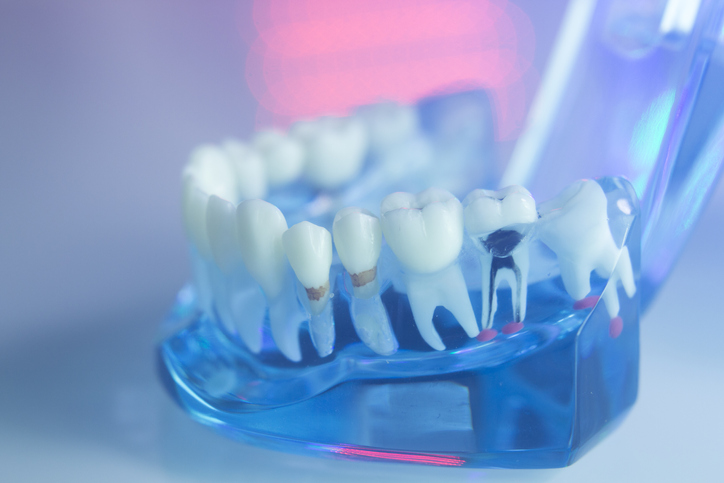EVERYTHING ABOUT ROOT CANAL TREATMENTS

For conscientious dentists, it is always the highest priority to keep a tooth as long as possible because a tooth can perform important functions even if it is partially or even completely damaged or even deceased. At Evergreen Dental we attach great importance to the preservation of teeth and in this article we would like to take a close look at all eventualities.
WHY IS A TOOTH BROKEN?
First and foremost, tooth decay is the main cause of inflammation on the gums, and bacterial attacks can damage teeth over time so that, for example, the gums recede and an abnormal mobility of the teeth occurs. This increase in mobility is gradually intensified by the spread of caries and the simultaneous, constant chewing pressure. The results are a mobility level of the tooth that no longer allows performance to function, inflammation that causes pain and needs to be eliminated. The ultimate solution is always the removal of the broken tooth because it can automatically dissolve the inflammation, but losing a tooth is always a burden on both the body and the mind. An ancient method in dentistry is an interim solution that cannot save the vitality but the physical preservation of the tooth. This is called root canal treatment.

WHAT HAPPENS DURING ROOT CANAL TREATMENT?
During a root canal treatment, the tooth interior, the so-called vital pulp is removed, so that the tooth is virtually dead, but so often the inflammation can be eliminated and the tooth can be obtained. The pulp is removed using special needles and the canal containing the pulp is thoroughly cleaned. The thoroughness of the treatment is very much related to the long-term success of the root canal treatment, because the canal must be fully cleaned on the one hand and very precisely sealed.
For this procedure, the dentist has various state-of-the-art equipment available. The diagnosis is made by small X-rays of the affected tooth, in justified cases even 3D C-scans are taken. To measure the parameters of the canal, the dentist can use an apex locator, during the procedure the dentist can use a magnifying glass or a microscope to do the very detailed work.
After the pulp has been removed, a medical irrigation is first made and the canal is filled either provisionally or definitively with root filling material. Often only provisionally filled in the first place because this way the dentist can check after a few weeks, how the tooth has responded to the medical care. If necessary, this process can then be repeated, often several times before the dentist brings in the definitive filling.

CAN THE TOOTH BE PRESERVED AFTER ROOT CANAL TREATMENT?
Unfortunately, there is no guarantee that the tooth can be maintained long term after treatment. It is up to the dentist to judge how good the chances are that the tooth will not have to be removed in time after the treatment. Rather, root canal treatment should be seen as a possibility that a broken tooth, which may no longer be preserved, will bypass the distance. In any case, you should talk to the dentist in great detail about it, so that you get a realistic picture of expectation and that you will not be disappointed in hindsight. Honest dentists give a realistic prognosis and leave the patient to decide whether this attempt should be started or not, because the procedure may take several months, which of course costs time and money.
FAQ
What can be done with a root canal treated tooth?
A tooth without pulp is no longer vital, but can still fulfil chewing and aesthetic functions and can also be used for further care, for example by putting a crown on top of it or as a pillar for a bridge construction. Root canal treated teeth may discolour, whereas internal tooth whitening or crowning may provide relief. If a root canal treated tooth is over-crowned then in most cases a so-called root pin will be used for additional stabilization and reinforcement. This pin is created individually in the dental laboratory, usually made of metal, ceramics or glass fibre. This pin is fixed in the root canal and forms a strong unit with the crown. Since a lot of tooth substance is often lost in a root canal treatment, this procedure is particularly important for a prosthetic restoration.
How long does the root canal treatment take?
A tooth can have different numbers of channels. The incisors usually have 1-2 canals, teeth 3-4, but sometimes 5 canals. The work is of course made more difficult by the fact that with each canal all the work has to be made aggravating added that the canals often have a very complicated, curvy shape, which can make a corresponding intrusion, cleaning and filling incredibly complicated. You can expect about one and a half hours per session per root canal. If the process is repeated, it usually takes 4-6 weeks before the next session and, depending on the case, this process may need to be repeated 3-4 times. The transitional period is necessary to see how the tooth reacts to the treatment, whether a new medical disinfectant rinse, further cleansing is necessary before the tooth is definitely filled.
How much does a root canal treatment cost?
The price can be very different it also depends on whether you visit a high-tech endodontic specialist who specializes only in this type of treatment. In the UK one can expect 400-600 € per canal with a specialist. At Evergreen Dental, root canal treatment + root canal filling costs € 160 for one canal, € 240 for two canals, € 350 for three canals and € 400 for four canals.
To whom do we recommend root canal treatment?
The dentists of Evergreen Dental are very open and honest in predicting the expected outcome. We always try to make a very realistic assessment of whether it is worth trying the root canal treatment. In some cases, especially with a prosthetic restoration, it is also essential in the sense of the great solution to carry out the root canal treatment in advance. Very important is the communication between dentist and patient.
What happens if a restored, over-crowned tooth causes problems later?
A crown is usually made for decades. It may well be that a destroyed but worthy to keep tooth later causes problems, for example because the tooth becomes inflamed and sensitive over time. In this case, it is possible to drill through the crown from above and to treat the tooth under the crown through this hole. After that, the hole in the crown can be closed again so that no visual or functional damage occurs.
EVERGREEN KNOWS THE SOLUTION!
If you have a dental problem, are not sure whether the tooth should be removed or treated with root canal, then get in touch with us, come to a non-binding preliminary examination or send us your recordings and we will give you an honest, realistic opinion.